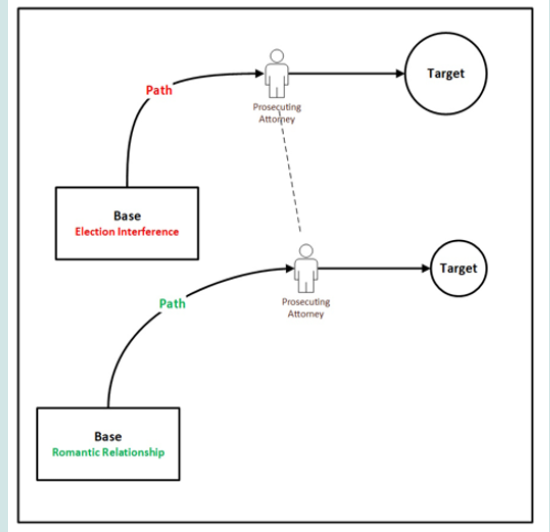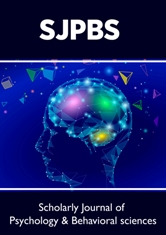
Lupine Publishers Group
Lupine Publishers
Menu
ISSN: 2641-1768
Research ArticleOpen Access
Emotion and Rationality: The Psychology of Decision-Making Manipulation Volume 8 - Issue 1
Hamid A Rafizadeh*
- Emeritus Professor, Bluffton University; Adjunct Professor, University of Dayton
Received: March 04, 2024; Published: March 12, 2024
Corresponding author: Hamid A Rafizadeh, 320 Northview Road, Oakwood, OH 45419, USA.
DOI: 10.32474/SJPBS.2024.08.000877
Introduction
The legal proceedings surrounding the election interference allegations against Mr. Trump serve as a compelling case study, demonstrating how the interplay between emotions and rationality significantly influences decision-making outcomes. This analysis highlights the nuanced ways in which individuals navigate complex legal challenges, particularly those with significant resources and influence, such as Mr. Trump. By examining this case, we gain insight into the strategic deployment of emotional manipulation within legal contexts and the unequal power dynamics that shape such tactics, underscoring the unique advantages afforded to affluent and powerful individuals in influencing the course of justice.
In August 2023, the legal landscape took a dramatic turn as a Fulton County grand jury indicted former President Mr. Trump. The charges alleged his involvement in attempting to overturn the outcome of the 2020 election, a desperate bid to retain power. How is this legal saga intertwined with the romantic entanglement involving one of the key figures-the prosecuting attorney assigned to Mr. Trump’s election interference case? This juxtaposition prompts an exploration of the psychological factors in play between these two seemingly disparate events. Understanding the connection between these two events necessitates the observation that every act of decision making is a composite of rationality and emotions. Decision making, inherently, is as much a product of emotional responses as of reasoned calculations and judgments, with each influencing the other [1,2]. To develop a deeper view of emotion and rationality in events that surround Mr. Trump and the prosecuting attorney, I employ the framework model—a universal view of every human action—which posits that human actions are guided by four components: base, path, human nature, and target. Every action, regardless of its nature, originates from a base, progresses along a path, and is shaped by human nature towards a specific target [3].
Crucially, human nature varies widely among individuals, influencing their emotional responses and reasoning capabilities. In walking along the path from the base toward the target, human can be skilled or not skilled, lazy or hard working, Machiavellian in manipulating everything to gain personal power, or dedicated to serving the needs of others, tense or calm, worried about some aspect of life or worried about some other aspect of life. Because of differences in how humans feel emotions and how they differ in reasoning, placing different people in the same position would produce different outcomes. Thus, in the case of Mr. Trump and the prosecuting attorney, the framework model elucidates how divergent emotional landscapes can lead to disparate outcomes. While the election interference case may seem devoid of emotional entanglements directly attributable to Mr. Trump, we observe an unexpected emotional element entering the case through the prosecuting attorney’s romantic involvement (Figure 1).
Figure 1 of the framework model illustrates this dynamic, highlighting that Mr. Trump cannot directly inject emotion into the election interference case. However, by exploiting the emotional link to the prosecuting attorney’s romantic affairs, Mr. Trump’s legal team maneuvers to elevate the emotional quotient of the case. Thus, Mr. Trump’s attorneys, instead of defending Mr. Trump’s actions in the election interference case, have produced several days of hearings filled with salacious testimony that has forced the prosecuting attorney to answer uncomfortable questions about her sex life and romantic getaways. This strategic maneuver aims to alter the “emotion content” of the election interference case and thus the trajectory of decision-making, recognizing that heightened emotional stakes can significantly influence outcomes. In judging the romantic involvements, whether the court allows the prosecuting attorney to stay in the election interference case, or she is replaced with someone else, the emotion content of the election interference case and the subsequent decision making have changed. As Figure 1 clearly demonstrates, by creating an emotion link, the focus of the case has changed from allegations of election interference to the prosecutor’s love life. The ramifications extend beyond mere courtroom proceedings. If she stays as prosecuting attorney, whatever she does would be tainted by the emotion link that has been established to her romantic life. And if she is replaced with someone else, that individual’s skills and emotional makeup would not be the same. In fact, depending on who the replacement is, the new prosecuting attorney can take any of the following paths. He or she could proceed with some or all of the charges against Mr. Trump, or even, in the extreme, drop the case altogether. We can only understand this wide variation in framework choices if we understand the diversity of emotional makeup of humans even when their reasoning skills are similar.
Figure 1: The strategy of increasing the emotion content of a case like election interference by linking it to another case like romantic relationship. The increased emotional content will alter the case’s decision making.

To illustrate the complexities of emotional dynamics, let’s examine the concept of “worrying.” The current prosecuting attorney’s worries take shape as concern regarding potential legal infractions. However, a successor’s worries may harbor different apprehensions, perhaps fearing repercussions from influential figures who hold sway over his or her career trajectory, thus affecting the stance on prosecuting Mr. Trump. Worrying, in this context, irrespective of its intensity or manifestation, serves as a cognitive rehearsal of adverse scenarios, influencing decisionmaking [4]. Notably, Mr. Trump is not immune to such concerns. His objective aligns with finding a successor whose worries mirror Mr. Trump’s, thereby skewing decision-making in his favor. Moreover, the involvement of a “nonpartisan council” in selecting the new prosecuting attorney inadvertently tilts the scales in favor of Mr. Trump, bolstering his political influence in the selection process. The emotional fabric of these decisions is further underscored by considerations of power, particularly wealth. Mr. Trump’s status as a wealthy and influential figure imbues him with disproportionate sway over legal proceedings—a stark manifestation of systemic inequalities within the legal system [5]. Lupu and Warner observe that this unequal treatment can be largely addressed with “good governance” [6]. But that absence of good governance is exactly what we see in Figure 1. The activities that in the election interference case must follow to conclusion are derailed, even if it is temporarily, by switching to the framework of potential romantic wrongdoings. At minimum, this strategy of mixing emotions with rational behavior would cause inevitable delay and lessen the probability of the case getting to trial before presidential election in November 2024 when Mr. Trump is expected to be the Republican nominee. And of course, if he wins the election and becomes President, he can apply presidential powers to get rid of the election interference case altogether, once again demonstrating, with clarity, the remarkable inequalities existing in electoral democracies when it comes to treating the rich and powerful. In short, this imbalance, exacerbated by a lack of effective governance, sidetracks the pursuit of justice, delaying proceedings and undermining the integrity of democratic processes. The temporal implications are significant, with the potential for delays jeopardizing the timeline for a trial before the pivotal 2024 presidential election. Mr. Trump’s anticipated candidacy underscores the urgency of expeditious legal proceedings, yet the manipulation of emotional narratives threatens to prolong the legal quagmire, perpetuating inequalities and impeding the pursuit of justice.
In essence, the convergence of legal proceedings and personal relationships unveils the intricate interplay between emotion and rationality in decision-making. As the legal saga unfolds, it serves as a poignant reminder of the enduring disparities ingrained within electoral democracies, wherein the wealthy and powerful wield disproportionate influence over the course of justice, perpetuating systemic injustices.
Conflict of Interest
No conflict of interest.
References
- Markič Olga (2009) Rationality and Emotions in Decision Making. Interdisciplinary Description of Complex Systems 7(2): 54-64.
- Greene J (2013) Moral Tribes: Emotion, Reason and the Gap Between Us and Them. New York: The Penguin Press.
- Rafizadeh Hamid (2018) The Sucker Punch of Sharing. Bloomington: Archway, pp. 60-61.
- McCaul KD, Mullens AB (2003) Affect, thought and self-protective health behaviour: The case of worry and cancer screening. In: Suls J, Wallston KA (Eds.) Social psychological foundations of health and illness. Blackwell Publishing, pp. 137-168.
- Hutchinson Allan C (2020) Practising law for rich and poor people: towards a more progressive approach. Legal Ethics 23(1/2): 3-12.
- Lupu Noam, Warner Zach (2022) Why are the affluent better represented around the world? European Journal of Political Research 61(1): 67-85.

Top Editors
-

Mark E Smith
Bio chemistry
University of Texas Medical Branch, USA -

Lawrence A Presley
Department of Criminal Justice
Liberty University, USA -

Thomas W Miller
Department of Psychiatry
University of Kentucky, USA -

Gjumrakch Aliev
Department of Medicine
Gally International Biomedical Research & Consulting LLC, USA -

Christopher Bryant
Department of Urbanisation and Agricultural
Montreal university, USA -

Robert William Frare
Oral & Maxillofacial Pathology
New York University, USA -

Rudolph Modesto Navari
Gastroenterology and Hepatology
University of Alabama, UK -

Andrew Hague
Department of Medicine
Universities of Bradford, UK -

George Gregory Buttigieg
Maltese College of Obstetrics and Gynaecology, Europe -

Chen-Hsiung Yeh
Oncology
Circulogene Theranostics, England -
.png)
Emilio Bucio-Carrillo
Radiation Chemistry
National University of Mexico, USA -
.jpg)
Casey J Grenier
Analytical Chemistry
Wentworth Institute of Technology, USA -
Hany Atalah
Minimally Invasive Surgery
Mercer University school of Medicine, USA -

Abu-Hussein Muhamad
Pediatric Dentistry
University of Athens , Greece

The annual scholar awards from Lupine Publishers honor a selected number Read More...




